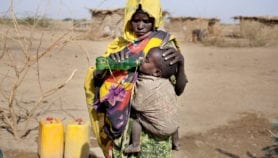By: Dann Okoth
Send to a friend
The details you provide on this page will not be used to send unsolicited email, and will not be sold to a 3rd party. See privacy policy.
[NAIROBI] A new programme to mitigate global health impacts of climate change and rapid urbanisation, especially in low-and middle-income countries, has been announced.
The programme is an initiative of the Malaysia-based United Nations University International Institute of Global Health (UNU-IIGH).
Tony Capon, the director of UNU-IIGH, tells SciDev.Net that his outfit officially announced the programme this month (16 June) with a mandate to advance interactive thinking to foster new insights into the health risks of global change.
“It is imperative that we integrate our thinking about the health of people and our planetary systems and trends in order to anticipate and mitigate problems ahead.”
Tony Capon, United Nations University International Institute of Global Health (UNU-IIGH).
According to Capon, the UN estimates that in the next 20-30 years, the population of urban areas will increase by two to three billion people, with the biggest influx expected in low and middle-income countries.
Capon adds that such population increase could result in massive resource consumption and waste production — pushing the cities to their limits.
“At some point soon we will reach a locked-in situation where massive structural inequalities in cities could precipitate critical environmental and health issues,” Capon explains. “It is imperative that we integrate our thinking about the health of people and our planetary systems and trends in order to anticipate and mitigate problems ahead.”
The new programme will help examine how climate change, rapid urbanisation and biodiversity loss impact health worldwide.
The UNU-IIGH, which was established in 2007 with a US$40 million endowment from the Malaysian government, aims to help build capacity of decision-makers to address global health challenges, according to a statement from the institute.
The endowment provides about US$2 million annually in interest income to fund UNU-IIGH’s core budget, and is augmented by smaller, unspecified contributions from other sources, says Capon.
“While it’s early days with the new programme, we already have seeding funds from the Asia-Pacific Network and the Swedish Research Council,” according to Capon, adding that more sustainable funding bids are being developed with international partners such as the Institute of Urban Environment of the Chinese Academy of Sciences.
Blessing Mberu, head of urbanisation and wellbeing at the Kenya-headquartered Africa Population Health Research Center, says that up to 60 per cent of urban residents in Africa live in informal settlements in squalid conditions.
“The settlements lack sewage and drainage systems, which expose the residents to severe climate events such as flooding, especially in coastal cities,” he explains.
Mberu adds that it is important to raise awareness worldwide and increase emphasis on mitigation measures for population problems, especially in Africa.
“The new programme is therefore welcome because it will identify and remove existing barriers, improve institutional capacities and technical expertise, and source projects to harness investment opportunities that spur climate-friendly growth and sustainable development,” he tells SciDev.Net.
This article has been produced by SciDev.Net's Sub-Saharan Africa desk.














